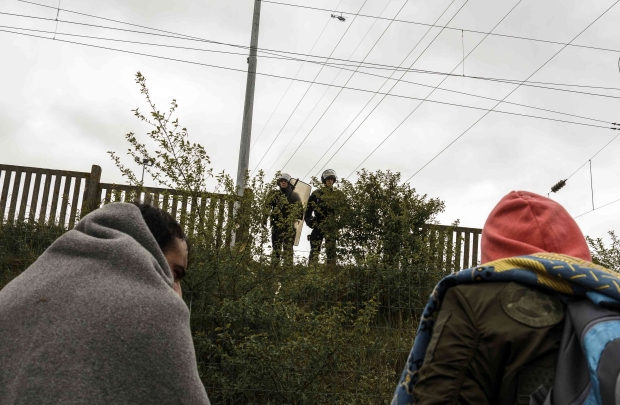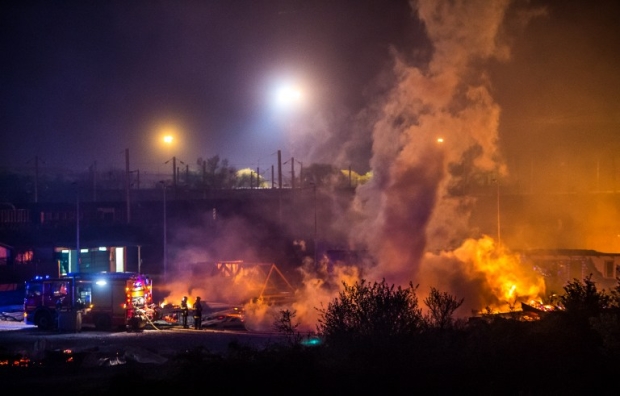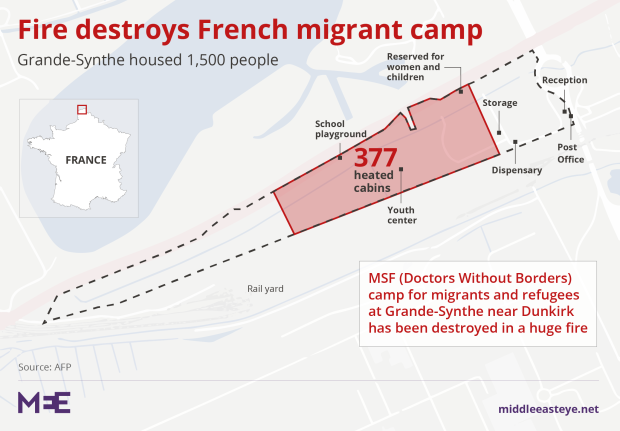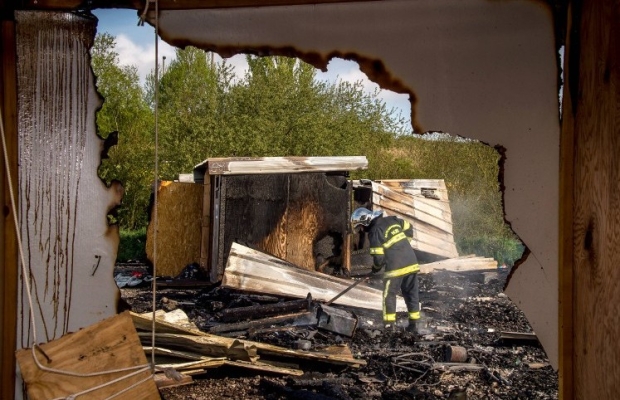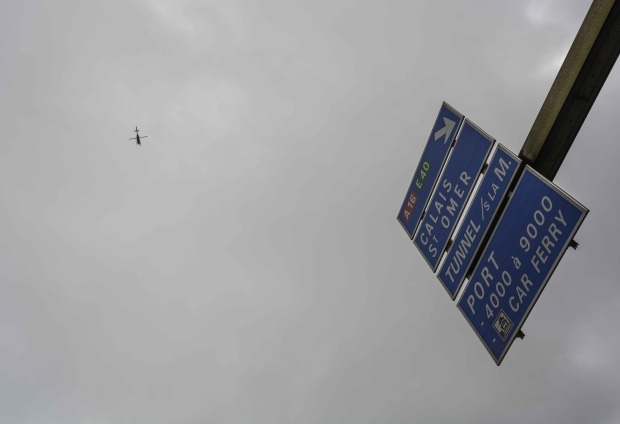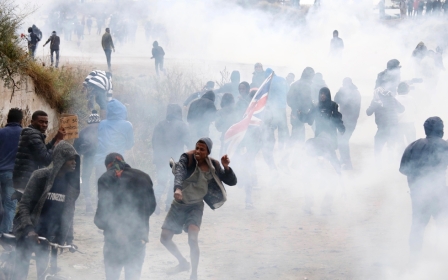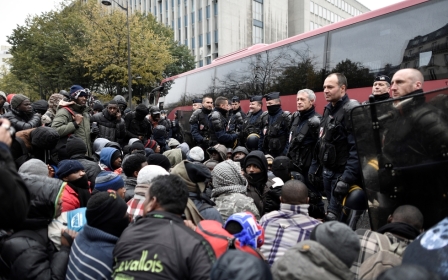After the fire: What next for the refugees from Dunkirk camp?
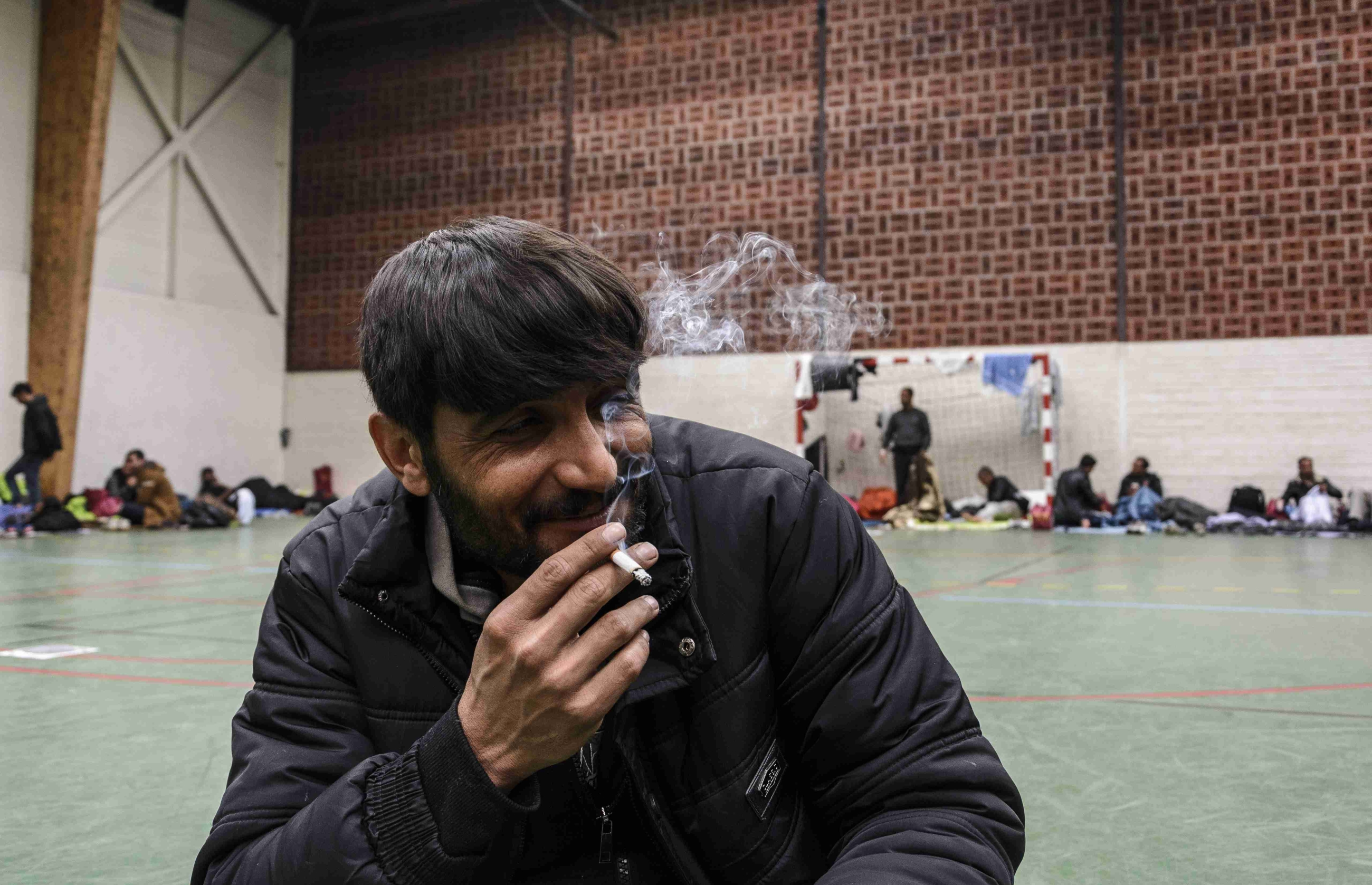
As a helicopter circles overhead, the stand-off between Afghan refugees and France's infamous CRS riot police marks the burnt-out end of the Grande-Synthe refugee camp in Dunkirk
Heavy sea-borne winds kick up sand and debris, strewing it in front of the now-blockaded entrance to the site, which only a few hours earlier had been home for an estimated 1,500 people.
Finally, a Pashtun-speaking policeman negotiates with the crowd of 100 or so, which was far from eager to move away from the camp that had been viewed favourably by its ever-growing population.
Disgruntled, the rest of the Afghan group begin making their way towards the centre of town.
A young Afghani adult - who lived in Britain for nine years before making the “mistake” of heading over to France - talks to MEE with a Pashtun-infused northern England accent on condition of anonymity (he is going through an ongoing asylum application).
"We need to be united," he explains, "but now they're going their own way.”
Tension in the camp
On the night of 10 April, a fire engulfed most of France’s only international humanitarian standard camp. By the early morning, around 80 per cent of the shelters - which housed approximately 1,500 people - had been destroyed, according to Help Refugees UK.
Many blame the blaze on an internal power struggle between Kurdish and Afghan refugees, compounded by the closure of the informal and infamous refugee camp in Calais - nicknamed "The Jungle" - in October 2016.
'No one is leaving the shelters for now, because we don’t know if there will be fights'
- Sayd, Afghan refugee
Since then, increasing numbers of people had arrived at the camp in Dunkirk, defying attempts by the French government to resettle them elsewhere in the country and still intent on reaching the shores of the UK.
Tensions spiralling from overcrowding and bleak prospects in the camp - dubbed by some observers as the "stuff of nightmares" - resulted in a prolonged brawl just before the fire, allegedly between Kurdish and Afghan refugees.
Sayd, an Afghan man in his 20s, is being housed at a temporary shelter in Dunkirk’s Grande-Synthe neighbourhood, one of four gymnasiums allocated by the French authorities. Inside the air is stale and suffocating. Around 150 men sleep on the bare floor. Women and children are housed separately.
“No one is leaving the shelters for now, because we don’t know if there will be fights,” says Sayd.
He is oblivious to the events of two nights ago. "We were on the motorway for three days, trying to stow away on trucks heading for England," he explains. “We didn’t know anything about the fire.”
His companion - who was on the motorway with Sayd - is unable speak due to the language barrier and simply motions to the few possessions he has left.
A Kurdish boy and girl, both no older than 10 years and wearing T-shirts and light trousers, huddle by Chloe Paupe, a French volunteer for the Red Cross, at a bus stop to escape the battling winds of northern France.
The children are going to see their father, who is housed elsewhere with their third sibling, a two-year old toddler. Their mother is currently serving a four-year prison term in Lille for allegedly throwing a rock at a riot policeman that left him with head injuries.
“I think it’s a big joke,”' says Paupe of the incident. "She was in hospital with the baby when it happened, the policeman arbitrarily pointed her out from the crowd."
Paupe highlights how the closure of the Calais camp more than a year ago has exacerbated the overcrowding problem elsewhere in northern France. "From December last year it became very tight. There were also fights [at the camp in Dunkirk] between Kurds and Afghanis,” she explains.
Mutiple testimonies from Afghanis also highlight the routine use and concealment of firearms and bladed weapons by some of the camp's inhabitants.
Election may influence their fate
Yet despite the odds, refugees continue with their efforts to crack open the trailer doors of lorries parked in unguarded motorway rest stops, or find more creative ways to stow away on trucks headed for the UK.
Even two days after the fire, large groups of young men can be seen huddling in the woods adjacent to the road, waiting for night time to begin their daily grind.
The future is unclear for the freshly displaced asylum seekers, but French residents may push the issue further up the national agenda again.
The sports halls are a temporary measure, and even a week for them to stay open is too long
- French immigration agency
With France’s presidential election looming in just two weeks' time, many fear that thecampaignn of Marine Le Pen, leader of the far-right National Front, may capitalise on the continuing crisis in the region.
“We don't want any camps, as the minister and president said yesterday,” Belmair, the chief of the French Immigration agency (OFII) in Calais, tells MEE. “The sports halls are a temporary measure, and even a week for them to stay open is too long.”
And Wafa Miazagun, an Afghani staying in a gymnasium, tells MEE: “We are waiting for the European community to take action, whether a new camp is set up or not."
As large numbers of families, unaccompanied minors and women continue to take shelter, Lyndsay McDade of the Dunkirk Refugee Children’s Centre, pleads for continued support from the public.
“The children’s centre on-site was reduced to ashes,” says McDade, who also promises to continue “providing a distraction from the trauma that surrounds the children, and to continue their fundamental right to play.”
Next stop Paris?
But others are less hopeful. The young Afghani MEE spoke to outside the camp on the night of the fire is already thinking of his next move.
"I’m sure the authorities are lying about another camp opening in four days," he says.
"Maybe we will go to Paris and wait to see if they open a new camp, and then come back.”
Middle East Eye propose une couverture et une analyse indépendantes et incomparables du Moyen-Orient, de l’Afrique du Nord et d’autres régions du monde. Pour en savoir plus sur la reprise de ce contenu et les frais qui s’appliquent, veuillez remplir ce formulaire [en anglais]. Pour en savoir plus sur MEE, cliquez ici [en anglais].


